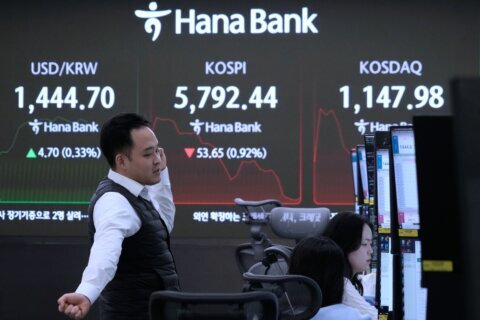KUALA LUMPUR, Malaysia (AP) — The astonishing assassination of North Korea leader Kim Jong Un’s half-brother rippled across Asia on Wednesday as Malaysian investigators scoured airport surveillance video for clues about the two female assailants and rival South Korea offered up a single, shaky motive: paranoia.
Kim Jong Nam, 46, was targeted Monday in a shopping concourse at Kuala Lumpur International Airport, said a senior Malaysian government official, who spoke on condition of anonymity because the case involves sensitive diplomacy. He had not yet gone through security.
Kim, who died on the way to a hospital, told medical workers before he died that he had been attacked with a chemical spray, the official said.
South Korea’s spy service said Wednesday that North Korea had been trying for five years to kill Kim Jong Nam. But the National Intelligence Service did not definitely say that it was North Korea, just that it was presumed to be a North Korean operation, according to lawmakers who briefed reporters about the closed door meeting with the spy officials.
The NIS cited Kim Jong Un’s alleged “paranoia” about his half-brother. Still, the NIS has a history of botching intelligence on the North and has long sought to portray the North’s leaders as mentally unstable.
In Malaysia, police were searching for clues in the CCTV footage from the airport, said Selangor police chief Abdul Samah Mat. The airport is in Selangor near Kuala Lumpur.
Kim Jong Nam was estranged from his younger brother, the North Korean leader. Although he had been tipped by some outsiders as a possible successor to his dictator father, others thought that was unlikely because he lived outside the country, including recently in Macau, Singapore and Malaysia.
He reportedly fell further out of favor when he was caught trying to enter Japan on a false passport in 2001, saying he wanted to visit Tokyo Disneyland.
Multiple South Korean media reports, citing unidentified sources, said Kim Jong Nam was killed at the airport by two women believed to be North Korean agents. They fled in a taxi and were being sought by Malaysian police, the reports said.
A Malaysian police statement confirmed the death of a 46-year-old North Korean man whom it identified from his travel document as Kim Chol, born in Pyongyang on June 10, 1970. “Investigation is in progress and a post mortem examination request has been made to ascertain the cause of death,” the statement said.
Ken Gause, at the CNA think tank in Washington who has studied North Korea’s leadership for 30 years, said Kim Chol was a name that Kim Jong Nam has traveled under. He is believed to have been born May 10, 1971, although birthdays are always unclear for senior North Koreans, Gause said.
Mark Tokola, vice president of the Korea Economic Institute in Washington and a former deputy chief of mission at the U.S. Embassy in Seoul, said it would be surprising if Kim Jong Nam was not killed on the orders of his brother, given that North Korean agents have reportedly tried to assassinate Kim Jong Nam in the past.
“It seems probable that the motivation for the murder was a continuing sense of paranoia on the part of Kim Jong Un,” Tokola wrote in a commentary Tuesday. Although there was scant evidence that Kim Jong Nam was plotting against the North Korean leader, he provided an alternative for North Koreans who would want to depose his brother.
The reported killing came as North Korea celebrated its latest missile launch, which foreign experts were analyzing for evidence of advancement in the country’s missile capabilities. For the next several days, North Korea will be marking the birthday of its late leader Kim Jong Il, the brothers’ father, though they have different mothers. The major holiday this Thursday is called the “Day of the Shining Star” and will be feted with figure skating and synchronized swimming exhibitions, fireworks and mass rallies.
Since taking power in late 2011, Kim Jong Un has executed or purged a slew of high-level government officials in what the South Korean government has described as a “reign of terror.” The most spectacular was the 2013 execution by anti-aircraft fire of his uncle, Jang Song Thaek, once considered the country’s second-most-powerful man, for what the North alleged was treason.
Gause said Kim Jong Nam had been forthright that he did not have political ambitions, although he was publicly critical of the North Korean regime and his brother’s legitimacy in the past.
Kim Jong Nam had been less outspoken since 2011, when North Korean assassins reportedly tried to shoot him in Macau, Gause said, though the details of the attempted killing are murky. South Korea also reportedly jailed a North Korean spy in 2012 who admitted to trying to organize a hit-and-run accident targeting Kim Jong Nam in China in 2010.
Despite the attempts on his life, Kim Jong Nam had reportedly traveled to North Korea since then, so it was assumed he was no longer under threat. Kim Jong Nam may have become more vulnerable as his defender in the North Korean hierarchy, Kim Kyong Hui — Kim Jong Un’s aunt and the wife of his executed uncle, Jang Song Thaek — appears to have fallen from favor or died. She has not been seen in public for more than three years, Gause said.
Kim Jong Il had at least three sons with two women, as well as a daughter by a third. Kim Jong Nam was the eldest, followed by Kim Jong Chul, who is a few years older than Kim Jong Un and is known as a playboy who reportedly attended Eric Clapton concerts in London in 2015. It’s unclear what positon he has in the North Korean government. A younger sister, Kim Yo Jong, was named a member of the Workers’ Party of Korea’s Central Committee during a North Korean party congress last May. She has a position in a propaganda and agitation department and is known as Kim Jong Un’s gatekeeper, Gause said.
While the most likely explanation for the killing was that Kim Jong Un was removing a potential challenger to North Korean leadership within his own family, he could also be sending a warning to North Korean officials to demonstrate the reach of the regime. It follows the defection last year of a senior diplomat from the North Korean Embassy in London who has spoken of his despair at Kim’s purges.
___
Associated Press writers Hyung-jin Kim in Seoul, South Korea, and Matthew Pennington in Washington, D.C., contributed to this report.
Copyright © 2026 The Associated Press. All rights reserved. This material may not be published, broadcast, written or redistributed.







